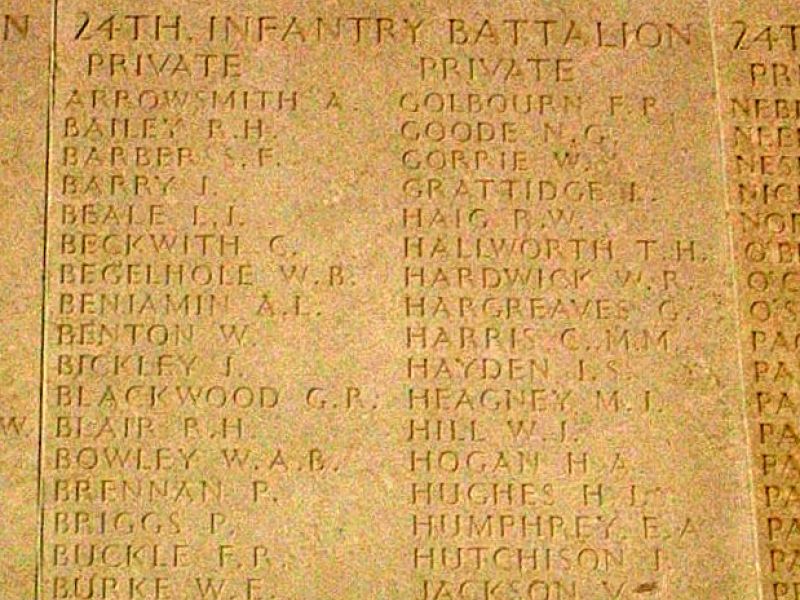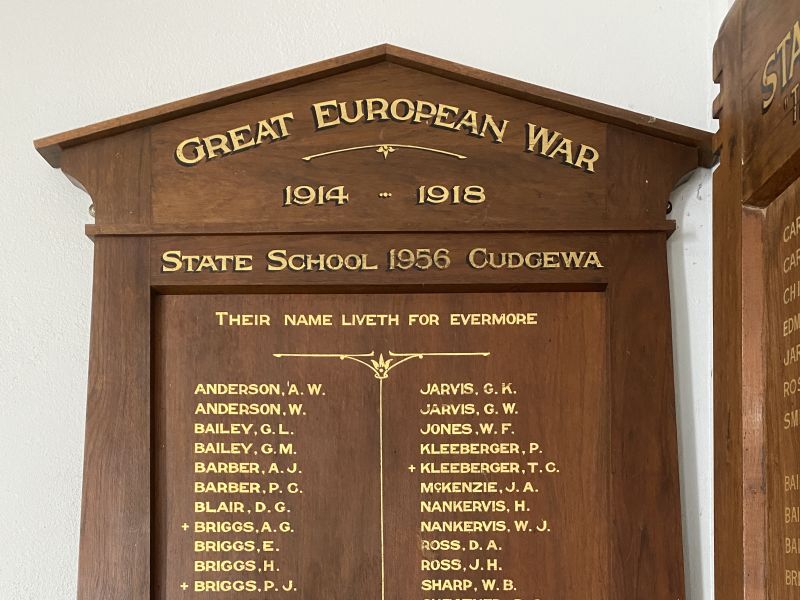Percy James Edmund Briggs
Percy was born in 1893 at Cudgewa, Victoria. He was the third of six children to Angus McIntyre and Ellen Jane (née Burke) Briggs. One of Percy’s older brothers, Ernest, also enlisted during the First World War, while one of his uncles, Walter Clement Briggs, was killed in action during the Boer War.
Percy enlisted on the 26th of March 1915 at Melbourne, Victoria. He was allotted the Regimental Number 601 and was taken on strength with C Company of the 24th Infantry Battalion. At the time of his enlistment he was a single, 21 year-old saw miller from Cudgewa in the Upper Murray.
The 24th Battalion was raised in May of 1915 at Broadmeadows Camp on the outskirts of Melbourne. Originally the battalion was to consist of recruits from states other than Victoria. However, due to the large number of Victorian recruits it was decided to make it up from Victorian volunteers. As a result of this hasty decision the battalion underwent very little training in Victoria.
The battalion embarked aboard HMAT A14 Euripides at Melbourne on the 8th of May 1915 disembarking at Alexandria, Egypt on the 12th of June. The lack of training back in Australia had to be made up for in Egypt during July and August. On the 30th of August it proceeded to join the MEF (Mediterranean Expeditionary Force) that was currently engaged on the Gallipoli Peninsula, arriving at Anzac Cove on the 4th of September. For the month that Percy was at Gallipoli his battalion shared duty in the Lone Pine trenches with the 23rd Battalion. The fighting at Lone Pine was still so dangerous and exhausting that battalions were rotated every day.
On the first day of October 1915, Percy was sent to the 6th Field Ambulance suffering from diarrhoea. By August eighty percent of the men at Anzac, and further south at Helles, suffered from severe diarrhoea and dysentery. These diseases were often exacerbated by the constant problem of flies. Charles Bean, the official Australian historian, wrote on June the 15th:
“We literally fought them for a quarter of an hour - waving our towels, burning Keatings, scattering them. We must have killed 1000 or 2000 but only excited them. They swarmed our faces, crawled all over us, dropped off the ceiling on to the floor. The place was filthy with them this morning - nothing but dead flies.”
Private Cecil McAnulty (1803) of the 3rd Infantry Battalion wrote in his diary in mid-June:
“The flies were simply unbearable. They are here in millions, from the size of a pin’s head to great bluebottles that bloated they can’t fly”
On the 3rd of October Percy had been transferred to the 1st Australian Casualty Clearing Station. His original diagnosis of diarrhoea had been changed to enteric fever commonly known as typhoid fever. Percy was immediately transferred to a hospital ship and sailed to England. On the 20th of October he was admitted to the Brook War Hospital at Woolwich. It wasn’t until the 19th of April 1916 that Percy was released from hospital and sent to the 5th Convalescent Depot at Coastal Health (Abbey Wood) in London. Percy would remain here for almost three months, regaining his strength and undergoing training exercises.
The next stop for Percy was at the 2nd Australian Division Base Depot at Etaples in France. A week later, on the 31st of July, he finally caught up with his old battalion, the 24th, as it was in the midst of the battle at Pozieres. The 24th battalion was part of the 6th Brigade of the 2nd Australian Division. They had already mounted one attack on the 29th of July. This had been a monumental failure with over 2000 casualties. The second attack which began on the 2nd of August resulted in the Division capturing German positions beyond the village. Unfortunately they suffered more heavy casualties from the German’s retaliatory bombardments. The 2nd Division’s losses over the preceding twelve days had totalled 6848 men.
The following was an account of what happened to Percy. The statement was made by Sergeant C Harcourt (633) of C Company, 24th Battalion as he was recovering from his wounds at Southall Hospital.
“24th Battn. Pte. Percy, 601, Briggs.
C. Coy Pte. J.C. 1700. Michael
A.I.F. Pte. G. 2210. Sims ,
Pte. J.G. 724. Tinkler
Missing Aug. 5th 1916
C. Company were moving to the front trenches between Mouquet Farm, and Pozieres at night. The guide lost his way and was subsequently killed. Meanwhile the Germans put up a heavy barrage and out of 180 men only 50 got to the front trenches. The ground where this occurred was thoroughly searched afterwards and a number of bodies were buried. No trace was found of the above men though they were all known to have been hit, as the ground was behind our front line, they must have been blown to pieces, or were buried by big shells.
Tinkler was an Englishman and formerly kept a small refreshment room at Paddington.”
Percy has no known grave but is remembered on the Villers-Bretonneux Memorial (Australian National Memorial - France). He is also remembered on the Australian War Memorial Roll of Honour, the Cudgewa State School Roll of Honour, and the Corryong War Memorial. For his service during the First World War, he was awarded the 1914-1915 Star, the British War Medal and the Victory Medal.

 Stephen Learmonth
Stephen Learmonth
